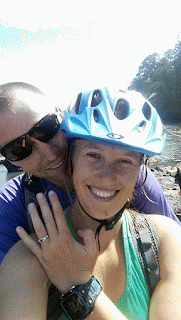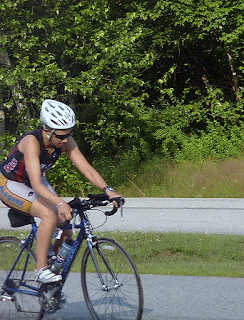Every time I push myself to go faster on the trail I feel like I'm having a terrible lap. The turns feel sketchy, I bump and bounce over the rough stuff, and even the littlest climbs make me hurt. But when I check Strava after the ride, I realize that I've ridden one of my fastest laps. This got me thinking, why is there such a disconnect with feeling good and going fast?
After talking with Alex and thinking about this, I believe it comes down to two things: (1) mountain biking speed and effort are not directly related and (2) speed is scary!
First, why doesn't more effort equal more speed on the trail? Mountain biking is kind of like swimming -- technique is way more important than pure power. When swimming, no matter how hard and fast you try to spin your arms and kick, if you aren't using good form then you'll end up putting a lot of effort into splashing in place (or what feels like it) instead of gliding effortlessly through the water. With mountain biking, instead of fighting against water resistance, it's roots and rocks, sharp turns, and steep climbs that eat speed. A smooth rider can float through these technical sections without losing speed. But if you're like me and your technical skills need work, you'll feel like you're splashing around in a sea of dirt.
This is all completely different from what I'm used to with road riding, where more effort equals more speed. You push harder on the pedals, you go faster. Pretty straightforward. But that all gets thrown out on the trail where one minute you're breathing easily as you cruise through a flowy section and the next you're huffing and puffing to make it up a climb. Where road riding is a steady burn, mountain biking is a series of little explosions. I can no longer use my learned sense of effort from the road to judge how I'm doing on the trail. It's been really frustrating to put in so much effort on the trail only to have every bump/corner/hill slow you down.
But I know, it takes time in the saddle and a lot of practice to improve technical skills. All that time on the bike gets you strong enough to charge up the hills and accelerate out of every turn. Then you can really fly on the trails, which brings me to my second point: speed is scary! Going faster cuts down on time you have to react to trail features (and makes those features hurt more when you hit them). When you're going fast, you're on the edge of control, that fine line between a new PR or wiping out. As you probably can guess, I like to be far away from that line, way over on the safe side. But according to Alex, when you really push your limits, it's almost always going to feel sketchy, no matter how good you get because you're always pushing yourself to go even faster.
So how can I (and hopefully you) feel more encouraged at the end of fast laps?
The two things that are helping me the most are better cornering and pushing myself to go faster more often. Cornering can be a whole other post, but what I think makes the most difference for me is looking through the turn instead of at the trees I'm trying to not hit. Look where you want to go, not where you don't want to go! (Alex's constant reminder). I have to always remind myself to do this, but as I get better at it, turns get faster and easier. And the more I ride fast, the more comfortable I get at higher speeds and the less scary everything seems. The real payoff seems to come the next time I ride. The speed that felt so scary before suddenly seems normal and I get to enjoy the rush of throwing the bike into turns and charging over the chunky stuff.
I need to get into the mindset that pushing for a new PR is going to feel rough, but it's an investment. Going faster than I ever have before means I'm going to be a little sloppy through the tough sections. I'll be uncomfortably close to that edge of control going into turns and my legs will burn trying to accelerate out of them. It's all worth it when I go on a group ride and can hang with the fast group compared to last season when I stayed back with the slower riders. Or when I look at Strava and what felt like an easy ride is a full minute faster than my best lap from the month before. But the most rewarding part is when we finish a lap and Alex is breathing hard to keep up. Because is there anything better than than making your husband work hard to keep up with you?
P.S. There's hope! My hard work is finally starting to pay off! And Alex was really out of breath after this one :)
P.S. There's hope! My hard work is finally starting to pay off! And Alex was really out of breath after this one :)
 Don't forget to like The Unexpected Mountain Biker on Facebook!
Don't forget to like The Unexpected Mountain Biker on Facebook!

















